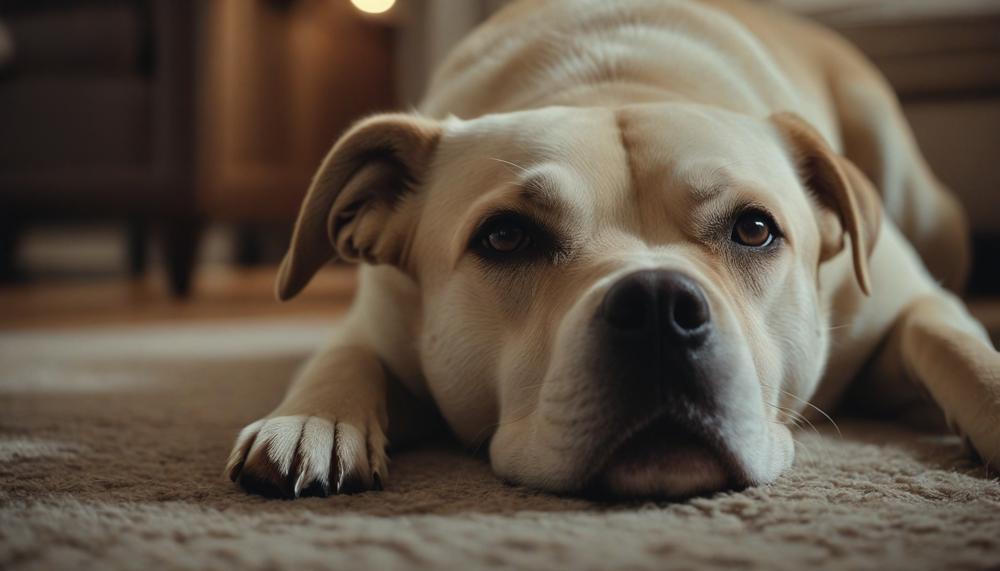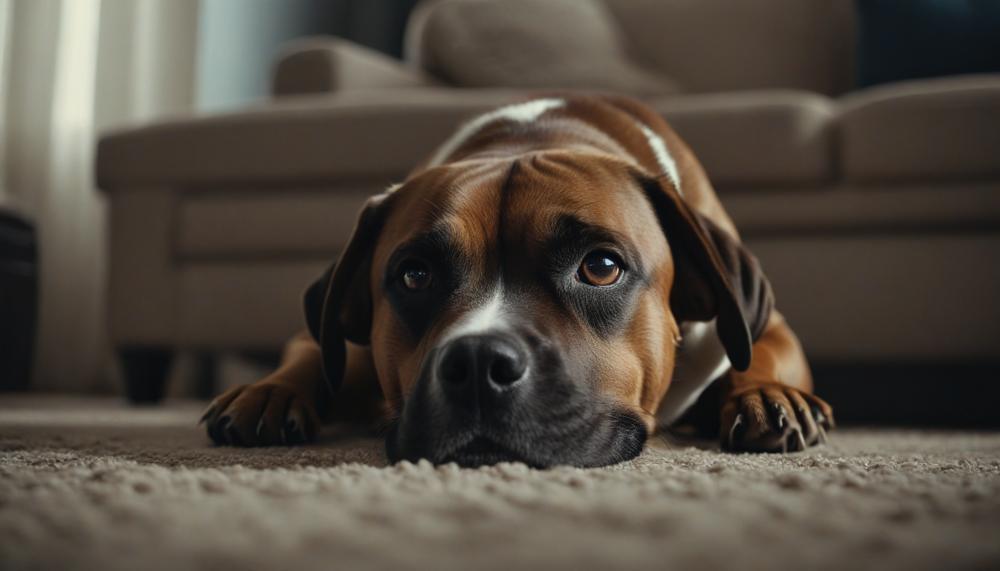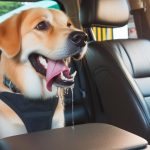Imagine being able to detect a scent at concentrations nearly 100 million times lower than what humans can perceive. That’s the superpower dogs possess with their incredibly sensitive noses. So, it’s no surprise that when you let one slip, your canine companion might hightail it out of the room.
This quirky behavior, amusing yet puzzling for many dog owners, opens the door to exploring the fascinating interplay between a dog’s sensory experiences and their responses.
In this blog post, we’ll delve into why your dog might decide to leave when you fart, unraveling the mysteries behind their acute olfactory system and their reactions to unexpected sounds. Here’s what you’ll discover:
- Sensory Overload: Understand how a dog’s highly sensitive nose can make certain smells overwhelming.
- Startle Response: Learn about the instinctual reasons dogs might be scared by the sudden sound of a fart.
- Behavioral Insights: Gain insights into whether dogs are aware of the concept of flatulence and how they deal with their own.
By the end of this read, not only will you have a deeper appreciation for your dog’s incredible senses, but you’ll also have a clearer understanding of their sometimes humorous, sometimes bewildering reactions to the most human of conditions—passing gas. So, let’s take a closer look and perhaps learn a bit more about how to coexist comfortably, even during those slightly embarrassing moments.
Reasons Why Your Dog Leaves When You Fart?
Table of Contents
Dogs possess a remarkable olfactory system that is significantly more sensitive than that of humans, making them highly reactive to various scents and odours in their environment. When humans release flatulence, the odour can be overpowering for dogs due to the concentration of certain gases, such as methane and hydrogen sulfide, which emit a strong scent.

Additionally, the sudden noise associated with flatulence can startle dogs, particularly if they are not expecting it.
This can lead to discomfort or even mild distress, prompting them to leave the room in search of fresher air or a quieter space.
| Reason | Explanation | Behavioral Response |
| Sensitivity to Odours | Dogs have an acute sense of smell, detecting odours at concentrations nearly 100,000 times lower than humans can. | Seeking areas with less potent smells, moving away from the source of flatulence. |
| Startle Reflex | The unexpected noise of flatulence can trigger a dog’s natural startle reflex. | Temporary retreat to a perceived safer or quieter environment. |
| Discomfort or Distress | Strong, unfamiliar scents can cause discomfort or confusion, leading to anxiety. | Leaving the room to escape the unsettling situation. |
So Why Are Dogs Afraid Of Their Own Farts?
Dogs may be afraid of their own farts primarily due to the unexpected noise and their sensitive sense of smell. The sound of a fart can startle a dog, much like sudden, loud noises such as fireworks or thunder.
This is particularly true for dogs who are naturally more anxious or noise-sensitive. Additionally, the odor released can be unpleasant for them, as dogs have a significantly more developed sense of smell compared to humans.
This combination of surprising noise and strong scent can lead to a startled reaction, causing some dogs to flee the scene in search of a more pleasant environment.
Here’s a breakdown of possible reasons in a table format:
| Factor | Description | Impact on Dogs |
| Noise Sensitivity | Dogs with high noise sensitivity may associate the sound of farts with other intimidating noises. | Increased likelihood of fear or anxiety responses to sudden loud noises. |
| Odor Sensitivity | A dog’s acute olfactory senses are overwhelmed by the strong odors of farts. | Discomfort or distress leading to avoidance behavior. |
| Surprise Element | The suddenness of a fart’s sound can surprise a dog, similar to how they might react to an unexpected touch. | Startled reaction, potentially causing the dog to leave the room or area. |
Are Dogs Gassy?
Indeed, dogs can be quite gassy. The tendency for a dog to be gassy primarily hinges on its diet and overall health. Various factors contribute to canine flatulence, including the type of food they consume, how they eat it, and their digestive health.
To discern whether their four-legged companions are experiencing gas, dog owners can watch for certain signs. These include the obvious passing of gas, a bloated abdomen, or changes in eating habits. Should your pup show discomfort or changes in bowel movements, it could be a signal of excessive gas.
Here’s a breakdown of common causes and guidance on how owners can manage these gassy bouts:
- Dietary Choices: Foods rich in fermentable carbohydrates, such as beans, cauliflower, and high-fiber ingredients, often lead to gas. Feeding your dog a balanced diet tailored to its specific needs can significantly reduce flatulence.
- Eating Habits: Dogs that eat rapidly tend to swallow air, which increases gas production. Using feeding puzzles to slow down eating can help minimize this.
- Health Issues: Intolerances or allergies to certain foods can also cause excessive gas in dogs. It’s crucial to identify these sensitivities early to adjust the diet accordingly.
- Exercise and Digestive Health: Regular physical activity helps stimulate digestion and reduce gas formation. Maintaining a consistent exercise routine for your dog is beneficial.
If you’re unsure about the cause or management of your dog’s flatulence, consulting a veterinarian is advisable. They can offer specific guidance tailored to your dog’s health needs.
Here’s a table summarizing the signs to watch for, common causes, and management strategies:
| Signs of Gas | Common Causes | Management Strategies |
| Passing gas, bloating, discomfort | Foods high in fermentable carbs, rapid eating | Diet modification, slow-feeding tools |
| Changes in bowel habits, frequent flatulence | Food intolerances, allergies | Identify and eliminate specific triggers |
| Consistent loud flatulence | Underlying health issues | Consultation with a veterinarian |
Are Dogs Gassy?
Yes, dogs can indeed be gassy. Gas accumulation in dogs is fairly common and can be influenced by various factors ranging from diet to underlying health conditions.
Owners might notice their pets passing gas audibly, appearing uncomfortable, or producing particularly foul-smelling gas.
Identifying and Alleviating Gas in Dogs
To determine if your dog is suffering from gas and to find solutions, here are practical steps and insights:
- Observation: First, note how often your dog passes gas. Occasional gas is normal, but frequent or extremely malodorous gas can signal a problem.
- Diet Evaluation: Examine what you’re feeding your dog. Foods that are high in fiber or difficult to digest can lead to gas. Consider high-quality dog food with real meat as the primary ingredient.
- Feeding Practices: Slow down your dog’s eating. Rapid eating can cause them to swallow air, leading to gas. Special slow-feeder bowls can help.
- Exercise: Regular physical activity helps stimulate digestion and can prevent gas buildup.
- Check for Food Intolerances: If diet changes don’t help, your dog might have a food intolerance. Consulting with a vet to identify potential allergens can be beneficial.
- Veterinary Visit: Persistent gas, especially when accompanied by discomfort or changes in bowel habits, warrants a vet check-up to rule out health issues.
Here’s a table detailing symptoms to watch for and tips to alleviate gas:
| Symptom | Possible Cause | Remedy |
| Audible Gas | Swallowed air during eating | Use slow-feeder bowls |
| Discomfort or Pain | Food intolerance or health issue | Consult a veterinarian |
| Foul-smelling Gas | Poor diet quality | Switch to high-quality dog food |
Conclusion
As we unravel the enigma of why your dog may seem to teleport out of the room at the mere hint of a human fart, it becomes evident that this behavior is deeply rooted in their exceptional sensory capabilities. With olfactory prowess that far surpasses our own, dogs can detect scents at concentrations nearly 100 million times lower than what humans can perceive.
This acute sensitivity transforms what might be a mere whiff to us into an overpowering torrent of scent for them, particularly the potent mix of gases like methane and hydrogen sulfide that flatulence emits.
Moreover, it’s not just the smell that might be sending your pooch scampering; the abrupt sound of a fart can also trigger their startle reflex. Imagine, if you will, the booming clap of thunder — sudden and jarring. For dogs, a fart can be a mini sonic boom; unexpected and startling.
Through this insightful exploration, we’ve gained a fresh perspective on how the world unfolds through a dog’s senses. This understanding doesn’t just enrich our knowledge but invites empathy towards our canine companions.






